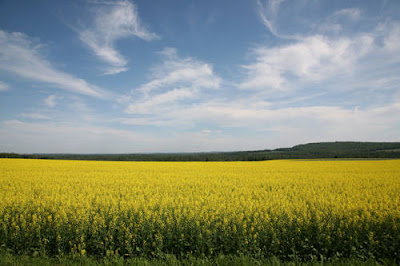Oregon
Appeals Court halts canola rules after farm groups say they would cause
'irreparable harm'
Responding to opponents' worry
that growing canola in the Willamette Valley would cause
"irreparable harm" to valuable specialty seed crops, the Oregon Court
of Appeals has ordered a temporary halt to state rules that would have allowed
canola planting this fall.
The court issued a temporary stay to an Oregon Department of Agriculture decision that would have opened perhaps 480,000 acres to growing canola. The decision puts a hold on planting until the court rules on objections raised by a coalition of vegetable seed farmers and food safety activists. The court may rule on the case by the end of August, according to the Associated Press.
Some farmers want to plant canola for processing into cooking oil or biodiesel fuel. They see canola as a valuable crop that can be safely grown in rotation with grass seed or grains. The state previously banned canola from a 3.7 million acre protected zone in the valley, but Aug. 3 revised that to allow canola plantings at the edges of the zone.
Although the state decision opens 480,000 acres to canola, the agriculture department believes only a fraction of that land would be planted in any given year. Farmers would grow it in rotation with other crops, planting canola two years out of any five.
Specialty seed and fresh market vegetable growers are outraged. They describe canola as an "aggressive and weedy species" that easily cross-pollinates and contaminates other crops and carries pests and diseases. According to a motion filed with the appeals court, canola pollen is documented to spread more than five miles and canola seed can remain in the soil for three years.
The motion says the Willamette Valley grows the majority of the world's Brassica seed crops, a genus that includes broccoli, turnip, radish, mustards, rutabaga and cabbage. In addition, almost all of U.S. canola is genetically engineered for resistance to Roundup, the most commonly used agricultural herbicide. That resistance will make it harder to control escaped canola plants, the motion says, and many international buyers will not purchase seeds that contain traces of genetically modified material.
They point to an Oregon State University report that said some seed buyers indicated they would "pull all contracts" if canola production is allowed.
Canola will do "irreparable harm and damage to a globally unique agricultural resource," opponents conclude.
The motion was filed by Friends of Family Farmers, the Center for Food Safety and Willamette Valley seed grower Frank Morton.
--Eric Mortenson, The Oregonian
The court issued a temporary stay to an Oregon Department of Agriculture decision that would have opened perhaps 480,000 acres to growing canola. The decision puts a hold on planting until the court rules on objections raised by a coalition of vegetable seed farmers and food safety activists. The court may rule on the case by the end of August, according to the Associated Press.
Some farmers want to plant canola for processing into cooking oil or biodiesel fuel. They see canola as a valuable crop that can be safely grown in rotation with grass seed or grains. The state previously banned canola from a 3.7 million acre protected zone in the valley, but Aug. 3 revised that to allow canola plantings at the edges of the zone.
Although the state decision opens 480,000 acres to canola, the agriculture department believes only a fraction of that land would be planted in any given year. Farmers would grow it in rotation with other crops, planting canola two years out of any five.
Specialty seed and fresh market vegetable growers are outraged. They describe canola as an "aggressive and weedy species" that easily cross-pollinates and contaminates other crops and carries pests and diseases. According to a motion filed with the appeals court, canola pollen is documented to spread more than five miles and canola seed can remain in the soil for three years.
The motion says the Willamette Valley grows the majority of the world's Brassica seed crops, a genus that includes broccoli, turnip, radish, mustards, rutabaga and cabbage. In addition, almost all of U.S. canola is genetically engineered for resistance to Roundup, the most commonly used agricultural herbicide. That resistance will make it harder to control escaped canola plants, the motion says, and many international buyers will not purchase seeds that contain traces of genetically modified material.
They point to an Oregon State University report that said some seed buyers indicated they would "pull all contracts" if canola production is allowed.
Canola will do "irreparable harm and damage to a globally unique agricultural resource," opponents conclude.
The motion was filed by Friends of Family Farmers, the Center for Food Safety and Willamette Valley seed grower Frank Morton.
--Eric Mortenson, The Oregonian

No comments:
Post a Comment